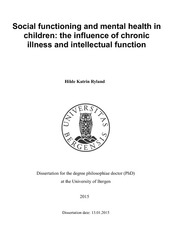| dc.contributor.author | Ryland, Hilde Katrin | |
| dc.date.accessioned | 2015-01-26T10:35:54Z | |
| dc.date.available | 2015-01-26T10:35:54Z | |
| dc.date.issued | 2015-01-13 | eng |
| dc.identifier.isbn | 978-82-308-2744-4 | eng |
| dc.identifier.uri | https://hdl.handle.net/1956/9250 | |
| dc.description.abstract | Chronic illness, and in particular neurodevelopmental disorders, are associated with an increased risk of mental health problems and social difficulties in children. Across the neurodevelopmental disorders, the presence of cognitive impairment, such as intellectual disability, is one factor which has been related to this increased risk. The overall aim of the present thesis was to extend our knowledge about the influence of chronic illness and intellectual function on mental health and social functioning in children. More specifically, we wanted to explore how chronic illness and intellectual function was related to mental disorders in children, to explore if children with chronic illnesses in which intellectual function tends to be compromised are prone to show more social difficulties than children with other chronic illnesses, and finally, we explored the relation between intellectual and social functioning in a sample of children representing a wide range of social functioning. Data stem from the first two waves of a longitudinal population-based study, the Bergen Child Study (BCS). The first wave was conducted when the children were 7-9 years old, in which an extensive screening questionnaire was administered to the parents and teachers. As part of this wave, 329 children were invited to take part in a comprehensive clinical examination. The second wave was conducted when the children were 11-13 years old, in which the parents, teachers, and the children themselves responded to a questionnaire similar to the one administered in the first wave. Intellectual function (IQ) and mental health were assessed as part of the clinical examination, which included a standardized IQ test (WISC-III) and a semi-structured clinical interview (Kiddie-SADS-PL) eliciting DSM-IV child psychiatric diagnoses and a general level of functioning score. Chronic illness was assessed by parent report in the questionnaires in the first and second wave, while social functioning was assessed by the Autism Spectrum Screening Questionnaire (ASSQ), which was part of the parent and teacher questionnaires in both waves. The present thesis showed that chronic illness was associated with a twofold increased risk of having a mental disorder. While having an IQ below the normal range and having a mental disorder was more frequent in children with chronic illness, IQ within the normal range or higher was associated with better mental health regardless of having a chronic illness. Having a neurodevelopmental disorder was associated with more social difficulties, represented by higher scores on the ASSQ, compared to groups of children with other chronic illnesses and without chronic illness. In a sample representing a wide range of scores on the ASSQ, IQ had a main effect on social functioning, with the ASSQ scores showing a gradual decline with higher IQ. Having an uneven IQ profile (discrepantly higher verbal- or performance IQ) was mainly unrelated to social functioning. The findings of the present thesis suggest that chronic illness and neurodevelopmental disorders in children are associated with an increased risk of mental disorders and social difficulties. IQ is closely related to mental health and social functioning in children, as the rate of mental disorders and social difficulties gradually decline with higher IQ, and vice versa. The present thesis emphasizes the importance of taking intellectual function into consideration when assessing mental health and social functioning in children, and calls for broad assessments of children with neurodevelopmental problems before reaching clinical conclusions. Future studies should include other measures of cognitive functioning, to further extend our knowledge about the influence of cognitive functions on mental health and social functioning in children. | en_US |
| dc.language.iso | eng | eng |
| dc.publisher | The University of Bergen | eng |
| dc.relation.haspart | Paper I: Ryland, H. K., Lundervold, A. J., Elgen, I., & Hysing, M. (2010). Is there a protective effect of normal to high intellectual function on mental health in children with chronic illness? Child Adolesc Psychiatry Ment Health, 4, 3. The article is available here: <a href="http://hdl.handle.net/1956/4715" target="blank">http://hdl.handle.net/1956/4715</a> | eng |
| dc.relation.haspart | Paper II: Ryland, H. K., Hysing, M., Posserud, M. B., Gillberg, C., & Lundervold, A. J. (2012). Autism spectrum symptoms in children with neurological disorders. Child Adolesc Psychiatry Ment Health, 6(1), 34. The article is available here: <a href="http://hdl.handle.net/1956/6617" target="blank"> http://hdl.handle.net/1956/6617</a> | eng |
| dc.relation.haspart | Paper III: Ryland, H. K., Hysing, M., Posserud, M. B., Gillberg, C., & Lundervold, A. J. (2014). Autistic features in school age children: IQ and gender effects in a population-based cohort. Research in Autism Spectrum Disorders, 8(3), 266-274. Full-text not available in BORA. The published version is available at: <a href="http://dx.doi.org/10.1016/j.rasd.2013.12.001" target="blank">http://dx.doi.org/10.1016/j.rasd.2013.12.001</a> | eng |
| dc.title | Social functioning and mental health in children: the influence of chronic illness and intellectual function | eng |
| dc.type | Doctoral thesis | |
| dc.rights.holder | Copyright the author. All rights reserved | |
